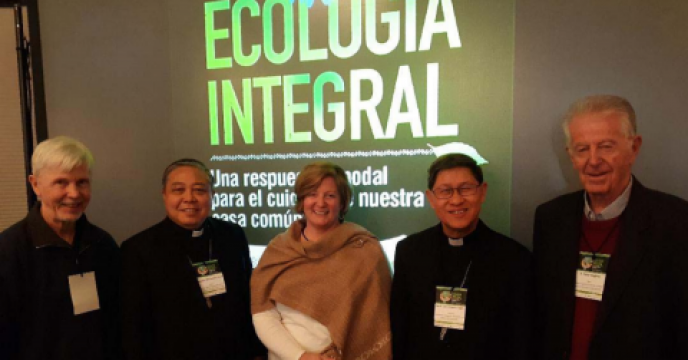“To know Creation is to know the Creator.” –St. Columban
For more than 30 years, Columban missionaries have been at the forefront of protecting the environment from destructive practices and addressing the urgency of climate change. Our mission experience of living with the natural world and with communities that have been marginalized and exploited impels us to seek ways to restore right relationships with all of Creation.
We advocate for bold action to address Climate Change.
In particular, human-induced climate change is the most serious and pressing ecological challenge facing the world today. The reality of climate change compels us to both personal and structural changes.
Climate change, largely driven by our reliance on fossil fuels, has led to extreme weather events, rising sea levels, severe droughts, a loss of biodiversity, food insecurity, and higher rates of migration which affect the poor and vulnerable in nations across the world.
Columban Missionaries around the globe stand in solidarity with communities impacted by climate change. In Burma and Peru, missionaries watch as glaciers, a main water and irrigation source, continue to disappear. In the Philippines and Fiji, extreme weather events and rising sea levels threaten coastal communities where agriculture and fishing are a main source of economic stability. Severe droughts cause food and water shortages in Pakistan and the U.S.
We advocate for sustainable development and agricultural systems.
Across the world, in countries that are rich in oil, gas and minerals, extractive industries have inflicted lasting damage to poor and indigenous communities and to Creation. Based on their experience in communities negatively affected by mining and other extractive projects, Columbans challenge this model of development based on the intensive exploitation of natural resources.
Large-scale agribusiness has also been detrimental to the land and people. Genetically Modified Organisms (GMOs) threaten the integrity of creation and the life God made good, and they have extremely damaging effects on the livelihoods of small-scale farmers and economies throughout the world.
We advocate for the right to water.
According to the Catholic Church, the right to water, as all human rights, finds its basis in human dignity and not in any kind of assessment that considers water merely as an economic good. Water, the basis for all human life, is a sacred source of life we must protect. Without adequate access to clean water, the health, nutrition, and sanitation of poor communities, and especially women and children, suffer. Without water, life is threatened.
Environmental Justice Resources:
We have spent the last 200 years or so trying to deny the shadow side of our birth as a nation. Coming to terms with this history is vital for the future not only of indigenous people but of us non-aboriginal people as well.

Columban representatives Scott Wright (left), Peter Hughes (right) and Amy Echeverria (center) at the Pre-Synod Conference on the Amazon at Georgetown University with Archbishop Bernardito Auza and Luis Cardinal Tagle, from Manila.
We all have moments in our lives, like my daughter’s birth, when we feel both the immensity and intimacy of life tightly wound together. The Synod on the Amazon is one of those moments in the life of the Church – a moment when the Church, the people of God, and all of Creation are totally universal and utterly unique at the same time.
"The Story of Climate Change" is a free resource that documents how climate change impacts vulnerable communities around the world, and what you can do to stand in solidarity with those communities.
At first blush, environmental justice may sound nonessential to a life of faith. Many Catholics aren’t exposed to spiritual reflections on God’s creation or questions of environmental care at mass or during formation programs like confirmation or RCIA. But this shouldn't be the case.
We must respect indigenous communities as the protagonists of their own destinies. In many cases, they've already developed solutions to the problems they face, and their challenge implementing these solutions is that they don't have the cooperation of governments, corporations, and other power-brokers. As citizens and consumers, we have a responsibility to hold these institutions accountable.
Much comes back to reviewing consumption beyond Earth's finite resources, challenging the commodification of life, alongside practical initiatives to get back to working with life systems and not against them. It is a commitment to hand on to future generations of human beings the beauty and abundance that is God's gift to us. And future generations are demanding now that their rights are recognised.
Copyright © 2025 Columban Center for Advocacy and Outreach, Washington, D.C.